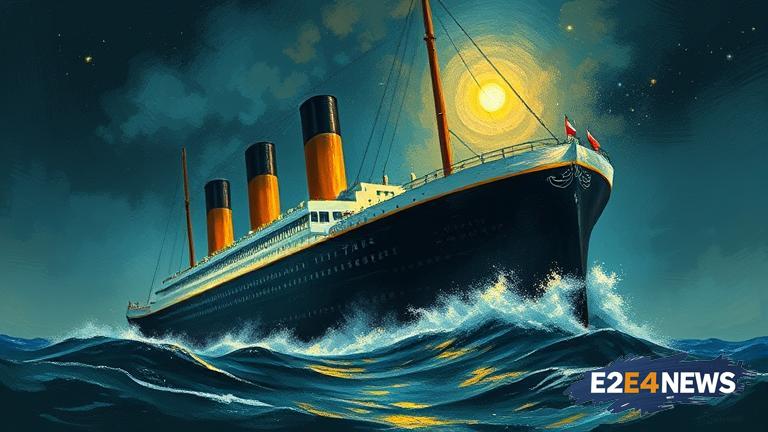The Titanic, one of the most infamous maritime disasters in history, has been the subject of intense scrutiny and debate for over a century. The recent documentary, Titanic Case Closed, presents a thorough examination of the events leading up to the tragedy, utilizing cutting-edge technology and expert analysis to piece together the puzzle. The investigation reveals that a combination of factors contributed to the sinking, including excessive speed, inadequate safety measures, and a catastrophic collision with an iceberg. The documentary also explores the role of human error, with the ship’s crew and owners facing criticism for their actions in the face of impending disaster. Furthermore, the program delves into the social and economic context of the time, highlighting the class divisions and hubris that characterized the era. The Titanic’s sinking resulted in the loss of over 1,500 lives, with many more left to pick up the pieces and wonder what could have been done to prevent the tragedy. The documentary features interviews with experts, survivors, and family members of those affected, providing a poignant and personal perspective on the events. The investigation also examines the aftermath of the disaster, including the inquiries and lawsuits that followed, and the impact on the shipping industry as a whole. In addition, the program explores the cultural significance of the Titanic, from its depiction in film and literature to its enduring symbolism as a metaphor for tragedy and loss. The documentary concludes by reflecting on the lessons learned from the Titanic’s sinking, and how they can be applied to modern-day maritime safety and disaster prevention. The Titanic Case Closed is a gripping and informative documentary that sheds new light on a tragedy that continues to captivate audiences around the world. With its meticulous research and engaging narrative, the program is a must-watch for anyone interested in history, maritime disasters, or the Titanic itself. The documentary’s use of advanced technology, including 3D modeling and virtual reality, allows viewers to experience the events in a unique and immersive way. The program also raises important questions about accountability and responsibility, highlighting the need for greater transparency and safety measures in the maritime industry. The Titanic’s legacy extends far beyond the tragedy itself, with the ship’s story continuing to inspire and educate people to this day. The documentary is a testament to the power of investigative journalism and the importance of uncovering the truth, no matter how complex or difficult it may be. The Titanic Case Closed is a significant contribution to the ongoing conversation about the Titanic, and its findings and insights will undoubtedly be of great interest to scholars, historians, and the general public alike. The program’s impact will be felt for years to come, as it challenges our understanding of the past and encourages us to think critically about the present. The documentary’s exploration of the human cost of the tragedy is particularly poignant, highlighting the devastating impact on families and communities. The Titanic’s sinking was a watershed moment in history, marking a turning point in the development of maritime safety and regulation. The documentary’s examination of the cultural and social context of the time provides a fascinating glimpse into the world of the early 20th century. The program’s use of archival footage and photographs adds a unique visual dimension to the narrative, bringing the events to life in a vivid and compelling way. The Titanic Case Closed is a masterful documentary that will leave viewers with a newfound appreciation for the complexity and nuance of the Titanic’s story. The program’s conclusions are both thought-provoking and deeply moving, inviting viewers to reflect on the significance of the tragedy and its ongoing relevance today.





